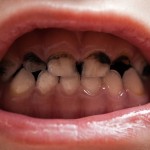
Early childhood caries remains a significant problem in many parts of the world and has been defined by the American Dental Association as:-
the presence of one or more decayed (non-cavitated or cavitated lesions), missing (due to caries) or filled tooth surfaces in any primary tooth in a preschool-age child between birth and 71 months of age. The term “Severe Early Childhood Caries” refers to “atypical” or “progressive” or “acute” or “rampant” patterns of dental caries.
The aim of this study was to assess the effect on caries of providing training in infant feeding guidelines to workers at Brazilian public primary care clinics.
In this cluster-randomized controlled trial randomisation was based on health care clinics. Clinics were either were trained in guidelines for infant nutrition, stressing healthful complementary feeding, or were assigned to a ‘usual practices’ control, which allowed for maternal counseling at practitioner discretion. Training was delivered once and included ‘Ten steps’ recommendations:-
- Exclusive breastfeeding to 6 mos of age;
- Continued breastfeeding to 2 yrs of age, with gradual introduction of complementary foods;
- At 6 mos, start complementary feeding (grains, meat, fruits) 3 times daily while continuing breastfeeding;
- Mealtimes at regular intervals, adjusted to the child’s internal hunger cues;
- New foods should gradually get thicker until the child is ableto eat a family meal, but foods should never be liquefied;
- Provision of a variety of healthy foods every day;
- Daily intake of different fruits and vegetables;
- Avoidance of sugar, sweets, soft drinks, salty snacks, and processed and fried foods;
- Implementation of good hygiene practices in food preparation and handling; and
- Adequate, responsive feeding during illness.
The amount of counselling provided was not measured and early childhood caries was assessed at 3-years of age.
- 15 mother-child pairs were enrolled at base-line and dental outcomes were available for 64.1% (458/715) of the initial sample. Drop-outs were due to withdrawal from the study or inability to locate and did not differ significantly by allocation status
- Early childhood caries (ECC) measured at age three years was not statistically significant
- overall reductions in ECC (relative risk, 0.92; 95%CI, 0.75, 1.12)
- severe ECC (RR, 0.87; 95%CI, 0.64, 1.19).
- There was a protective effect among mothers who remained exclusively at the same health center (S-ECC RR, 0.68; 95%CI, 0.47, 0.99) and among those naming the health center as their principal source of feeding advice (S-ECC RR, 0.53; 95%CI, 0.29, 0.97).
The authors concluded
Health care worker training did not yield a statistically significant reduction in caries overall, although caries was reduced among children of mothers more connected to their health centers.
Comment
This is a pragmatic community based trial and has there has been a 36% drop-out rate,the rates were similar in both groups with 65.8% being available from the intervention group and 62.3% from the control group.
Links
Chaffee BW, Feldens CA, Vítolo MR. Cluster-randomized Trial of Infant Nutrition Training for Caries Prevention. J Dent Res. 2013 May 20. [Epub ahead of print] PubMed PMID: 23690364
ADA statement on Early Childhood Caries

Use of infant nutrition guidance did not lead to a significant reduction in early childhood caries: Early chil… http://t.co/IkmDlbGh61